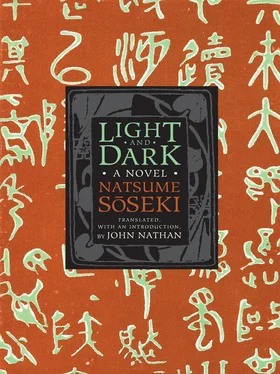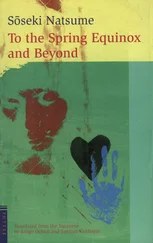“No, it’s getting late.”
“I don’t see why you have to make anyone feel embarrassed. Or are you saying that waiting for Hara-kun to finish eating will reflect poorly on your status as a gentleman?”
Hara, who had placed some ham on top of a shredded lettuce salad and was just digging in with his fork, paused.
“Don’t trouble yourself about me.”
Tsuda responded appropriately and was rising from his chair when Kobayashi spoke as if to himself.
“What can he be thinking this occasion is for? He invites a man to something he calls a farewell dinner and then insults the guest of honor by leaving him alone at the table and going home — with people like this in the world, no wonder life is miserable.”
“That’s not what I intended.”
“Then stay for a while.”
“There’s something I have to do.”
“I have a little something, too.”
“If it’s the painting, forget it.”
“I’m not twisting your arm to buy it. Don’t be such a cheapskate!”
“Then whatever it is, get on with it.”
“Not with you standing over me. Sit down like a gentleman.”
Obliged to take his seat again, Tsuda took a cigarette from the pack in his kimono sleeve and lit it. Glancing at the ashtray, he saw that it was already full of Shikishima butts. He reflected briefly that there could be no more fitting memorial to this evening. Like the others, the cigarette he was about to smoke would be reduced in under three minutes to ash and smoke and a butt that would end up cold and useless in the ashtray — somehow, the thought was dispiriting.
“So what is your little something? I assume you’re not looking for another handout?”
“There you go again, sounding like a cheapskate.”
Gripping the right front of his jacket with his right hand, Kobayashi reached inside his pocket with his left. As though groping for something he fumbled in the pocket, his eyes never leaving Tsuda’s face. Out of nowhere, an outlandish question framed itself in Tsuda’s mind, a bizarre delusion wispy as the smoke from his cigarette.
Is this scoundrel going to take a pistol from his jacket? Does he intend to stick it in my face?
A minute foreboding whispered through him, his nerves trembling like slender branches in an invisible wind. At the same time, regarding as a spectator the scene in the melodrama he had perversely imagined, his mind dismissed it as absurd.
“What are you looking for?”
“There are a lot of things in here; I can’t just pull something out until I know it’s what I want.”
“It would be awkward if it turned out to be the money you stuffed in there before.”
“There’s no mistaking the money. The money isn’t dead paper, it’s alive. It jumps like a fish when I touch it.”
Talking nonsensically the while, he withdrew an empty hand.
“I can’t find it — how weird.”
Kobayashi thrust his right hand into his left vest pocket but produced only a soiled handkerchief.
“You’re planning to do magic tricks with that?”
Kobayashi paid no attention. With a serious look on his face, he stood, patted both hips at once, and then exclaimed “Here it is.”
From his hip pocket he withdrew a letter.
“I’d like you to read this. And since we won’t be seeing each other for a while, it has to be tonight. Please have a look while I wrap up with Hara-kun. It’s a bit long, but it shouldn’t be much of a bother.”
Extending his hand mechanically, Tsuda took the letter.
 SCRAWLED IN pen on manuscript paper, it was more than twice the length of a normal letter. Moreover, though it was addressed to Kobayashi, the author was someone entirely unknown to Tsuda. When he had read the front and back of the envelope, he wondered what connection this could possibly have to him. But a kind of curiosity adjacent to his cold indifference beckoned him. Removing the ruled manuscript paper from the envelope, ten rows of twenty characters on each page, he read to the end without pausing.
SCRAWLED IN pen on manuscript paper, it was more than twice the length of a normal letter. Moreover, though it was addressed to Kobayashi, the author was someone entirely unknown to Tsuda. When he had read the front and back of the envelope, he wondered what connection this could possibly have to him. But a kind of curiosity adjacent to his cold indifference beckoned him. Removing the ruled manuscript paper from the envelope, ten rows of twenty characters on each page, he read to the end without pausing.
I find myself already regretting having come here. I know you’ll consider me capricious, but my feelings originate in a temperament altogether different from yours, and there is little to be done about it. But before you think “Not again!” please listen to my lament. I was asked to look after the place for a while, until the reorganization of the bank should be settled, because it seemed imprudent to leave the women alone at night. The terms offered me if I accepted the invitation were irresistible: if I wished to work on my novel I should feel free to, if I wanted to go to the library I could take a lunch with me; in the afternoons I could study painting if I liked. When the bank was finally relocated to Tokyo I should have my tuition for the college of foreign languages, I needn’t worry about dealing with the house, my moving expenses would be provided, and so on. Obviously, I didn’t count on all of this, but I was convinced that a certain percentage was true. But when I got here I found that none of it was; it was all lies dressed up as truth. Not only is my uncle mostly away in Tokyo, but I am treated as a houseboy and have no time for anything but the chores I am assigned from morning to night. My uncle refers to me as “our house boy” even in front of guests when I am standing there. Every task, from buying a pint of sake to dusting and polishing the wooden floor of the engawa , falls to me. And I’ve yet to receive one penny. When the one-yen clogs I was wearing cracked, I was fitted out with a pair that cost twelve sen. Promising to give us some money on the morrow, my uncle moved the family into my sister’s house, but once they were there he didn’t breathe another word about money, so I am left without even a home to return to.
My uncle’s business is swindling. He has no money at all. He and my aunt are extremely cold and extremely stingy people. For some time after I arrived, I had to endure an empty stomach and would return to my sister’s house once every three days or so for something to eat. Sometimes when we had run out of provisions we were obliged to make do with yams and potatoes. But not my uncle and aunt. My aunt is an extremely disagreeable person. She is calculating about everything, interested only in appearances, and is inclined to poke into everything around her, which often enough includes me, so that I feel the sting of her busybody’s needle. As for my uncle, broke as he is, he drinks his sake. And when he returns to the country he carries on like a lord. But if you look beneath the surface you find nothing but surprises. He’s even involved in more than one lawsuit. He can never leave on a train without dashing off to a pawnshop to raise money for a ticket, or going to my sister’s place and wheedling from her what he needs to get by; it seems he feels he’s repaying the loan with what it costs him to board me.
My aunt must have been thinking all along that I’d be paying my way with my writing; when she catches me with my pen in hand she’ll take a dig at me, asking what I expect to earn by scribbling on a scrap of paper. Sometimes, by way of dropping a hint, she’ll wave an ad in my face from the help-wanted column in the newspaper, “Hiring clerks.”
All this is repeated endlessly until I lose all sense of why I ever came here. I find myself thinking strange thoughts. The bizarre, utterly formless life of this family and the constantly shifting miasma of their internal circumstances haunt me day and night and I feel as if I am lost in a terrifying dream. When I consider that no one could possibly understand my plight no matter how I explained it, I must conclude forlornly that I am living all alone in a world inhabited by demons. Sometimes I feel I shall go mad. Properly speaking, when I begin to suspect that I have already lost my mind, I become unbearably afraid. Not only does no ray of light reach me in the underground dungeon where I suffer, but I feel I no longer have hands or feet. I suppose I feel that way because even if I lift my hands or move my feet, I remain in pitch-darkness. I can appeal all I like, a thick, cold wall blocks my voice and prevents it being heard. In all the world there is only me. I have no friends, and even if I did it would make no difference. Who, after all, would have a mind capable of touching the feelings of a ghostly presence like mine? An excess of pain has prompted me to write this letter. I haven’t written expecting to be rescued. I know your circumstances. I haven’t the slightest desire to receive any sort of material aid from you. If some portion of my pain, reaching you, would only create in the compassion flowing in your veins like lifeblood a swell of sympathy for me, I would be satisfied. For that alone would place within my grasp a guarantee that I exist in society as a member of the human race. Is there, I wonder, no single ray of light that can reach the vast world of people from the darkness of this devil’s confinement? I begin to think not. A reply from you, or no reply, will determine my certainty of this.
Читать дальше

 SCRAWLED IN pen on manuscript paper, it was more than twice the length of a normal letter. Moreover, though it was addressed to Kobayashi, the author was someone entirely unknown to Tsuda. When he had read the front and back of the envelope, he wondered what connection this could possibly have to him. But a kind of curiosity adjacent to his cold indifference beckoned him. Removing the ruled manuscript paper from the envelope, ten rows of twenty characters on each page, he read to the end without pausing.
SCRAWLED IN pen on manuscript paper, it was more than twice the length of a normal letter. Moreover, though it was addressed to Kobayashi, the author was someone entirely unknown to Tsuda. When he had read the front and back of the envelope, he wondered what connection this could possibly have to him. But a kind of curiosity adjacent to his cold indifference beckoned him. Removing the ruled manuscript paper from the envelope, ten rows of twenty characters on each page, he read to the end without pausing.









